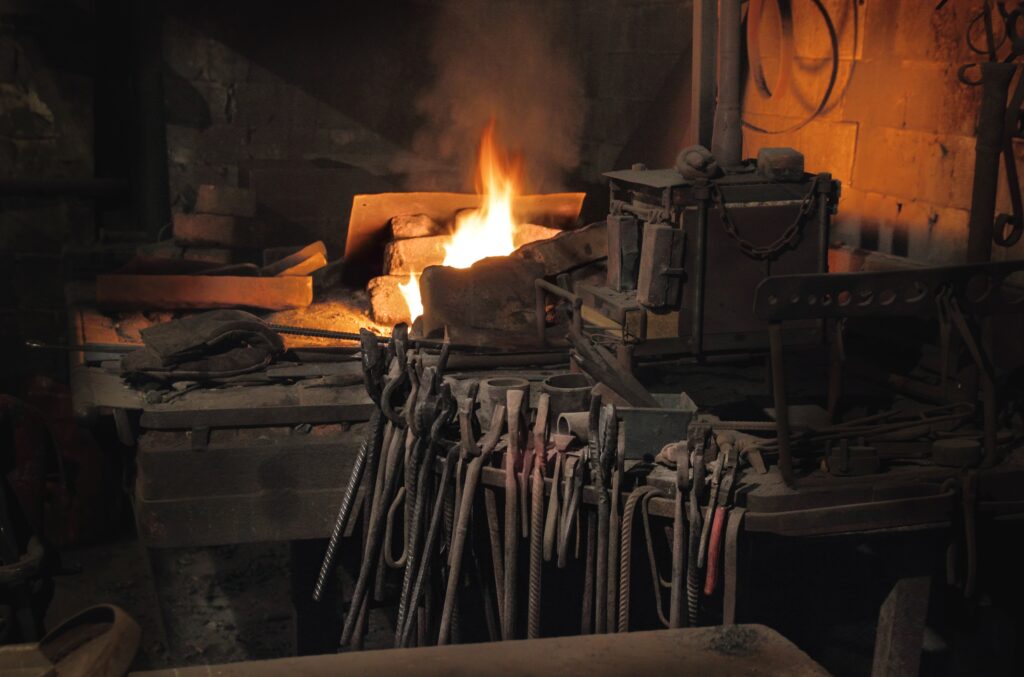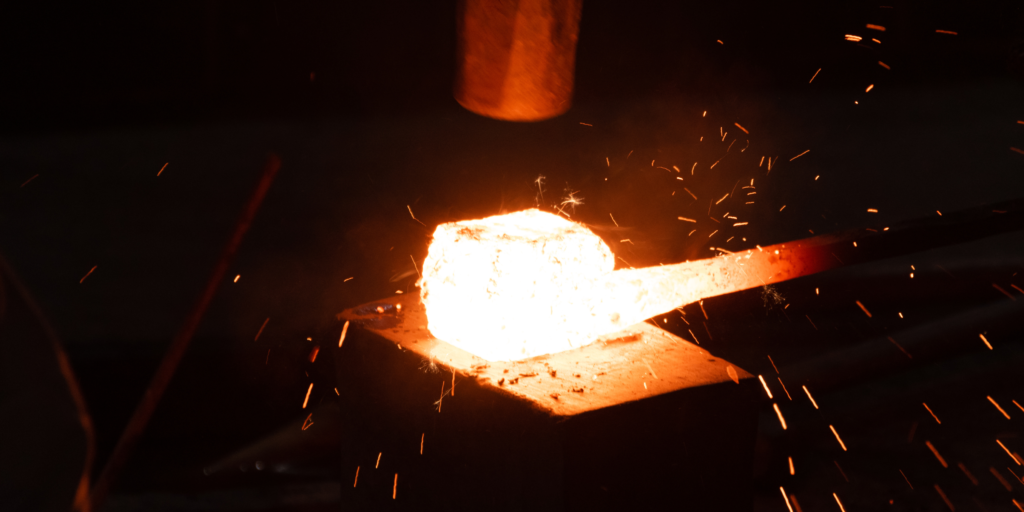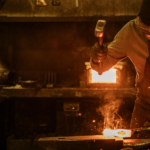In today’s highly competitive industrial landscape, modern manufacturing relies on advanced techniques to produce robust, reliable, and efficient components. One such critical process is forging. From automotive parts to aerospace applications, the use of forged components has been vital in driving innovation, safety, and performance. In regions known for their industrial expertise, such as Rajkot, forging services have become central to manufacturing solutions. This blog delves into the importance of forging in modern manufacturing, highlighting the process, its applications, and its future in the global industrial environment.
What is Forging?
Forging is a manufacturing process involving the shaping of metal using compressive forces. Unlike casting or machining, which involves melting or cutting, forging uses deformation through hammering, pressing, or rolling to shape metal. This process alters the material’s grain structure, making it stronger and more resilient to stress and fatigue. It has been used for centuries, but modern forging techniques have evolved to meet the demands of today’s industries, making the process faster, more precise, and scalable.
In locations like Rajkot, forging has become an integral part of the industrial ecosystem. Rajkot, known for its engineering and manufacturing capabilities, offers top-notch forging services that cater to industries such as automotive, railways, oil & gas, and agriculture. Businesses looking for reliable and high-quality forging solutions often seek out the best forging services in Rajkot to meet their needs.

Key Advantages of Forging in Modern Manufacturing
1. Enhanced Strength and Durability
One of the most significant advantages of forging over other manufacturing processes is the enhanced strength of the final product. During the forging process, the metal’s internal grain structure becomes compressed and aligned, giving forged parts superior strength and durability. This makes forging an ideal choice for components subjected to high levels of stress, such as engine parts, crankshafts, gears, and structural elements in machinery.
Industries such as automotive and aerospace demand materials that can withstand extreme conditions. This is why forged components are favored in these sectors, providing long-lasting performance and safety.
2. Versatility in Materials
Forging can be applied to a wide range of metals, including steel, aluminum, titanium, and copper alloys. This versatility allows manufacturers to choose the best material for a given application, ensuring that the forged part meets the necessary performance criteria.
For example, high-strength steel forgings are commonly used in heavy-duty applications like mining and construction equipment, while lightweight aluminium forgings are used in industries where reducing weight is critical, such as aerospace. In Rajkot, forging companies offer services that cater to a diverse set of material requirements, ensuring that businesses receive components tailored to their specific needs.
3. Cost Efficiency in Mass Production
Forging is highly cost-effective when it comes to producing parts in large quantities. The initial investment in forging dies and equipment is offset by the reduced material waste and shorter production cycles, making it an attractive option for mass production. Additionally, the durability of forged parts means that fewer replacements are needed over time, further reducing costs for manufacturers.
In regions like Rajkot, forging services are known for offering competitive pricing, particularly for businesses looking for high-quality yet cost-efficient solutions. This has made the city a hub for companies seeking reliable forge services in Rajkot to support their large-scale production needs.
4. High Precision and Quality Control
Modern forging techniques allow for high precision and strict quality control throughout the manufacturing process. Advanced technologies such as computer-aided design (CAD) and simulation software enable manufacturers to create forging dies with exact specifications, ensuring that each forged part meets the desired tolerances and dimensions.
Rajkot-based forging companies have embraced these modern techniques, delivering high-precision components that meet the stringent requirements of industries like aerospace, defense, and energy. When it comes to quality, companies that provide forging services in Rajkot have earned a reputation for excellence, making them trusted partners for global manufacturers.
5. Environmentally Friendly Manufacturing
Forging is considered an environmentally friendly manufacturing process. Since the metal is shaped under pressure rather than being melted, there is less energy consumption compared to processes like casting. Additionally, forging produces less material waste because the metal retains most of its original volume during deformation. This makes forging a sustainable option for companies looking to minimize their environmental footprint.
The eco-friendly nature of forging has contributed to its increasing popularity in various industries, particularly as companies are looking to adopt greener manufacturing practices. With its large network of eco-conscious manufacturers, Rajkot’s forging industry is well-positioned to lead the way in sustainable production.

Applications of Forging in Modern Manufacturing
Forging plays a critical role across a broad spectrum of industries. Here are some of the most common applications where forged components are essential:
1. Automotive Industry
The automotive industry has long relied on forged parts to ensure vehicle safety, performance, and durability. Critical components like crankshafts, connecting rods, and gears are often forged due to their need for high strength and resistance to wear. Rajkot’s forge industry is heavily involved in supplying components to automotive manufacturers both locally and internationally.
2. Aerospace Industry
In the aerospace sector, the weight-to-strength ratio is of paramount importance. Forging is used to produce lightweight yet incredibly strong components, such as turbine blades, landing gear, and structural elements of aircraft. The precision offered by modern forging techniques ensures that these parts meet the exacting standards required for air travel.
3. Oil & Gas Industry
The oil and gas industry requires parts that can endure harsh environments and high pressure. Forged components, such as valves, fittings, and flanges, are commonly used in pipelines and drilling equipment to ensure reliability and safety. Rajkot’s forging companies supply these critical components to oil and gas industries worldwide.
4. Mining and Heavy Machinery
Forging is widely used to manufacture parts for heavy machinery used in mining and construction, including shafts, gears, and wheels. These components must withstand extreme loads and abrasive conditions, making the forging process ideal for producing durable and reliable parts.
5. Railway Industry
Forged parts play a crucial role in ensuring the safety and efficiency of railway systems. Components such as axles, wheels, and couplings are forged to provide the necessary strength and longevity. Rajkot’s forging services contribute significantly to the railway industry by supplying high-quality forged parts.
The Role of Forging in Rajkot’s Industrial Growth
Rajkot, a city located in the western part of India, has become a prominent center for the forging industry. The city is home to numerous forging companies that cater to both domestic and international clients, providing high-quality, cost-effective solutions. The expertise available in Rajkot’s forging industry has made it a preferred destination for manufacturers seeking reliable and innovative forging services.
What sets forging services in Rajkot apart from other regions is the combination of modern technology, skilled labor, and a strong industrial network. Companies in Rajkot are equipped with state-of-the-art forging machinery, capable of producing a wide range of forged products for industries including automotive, oil & gas, and mining. This has enabled Rajkot to establish itself as a key player in the global forging market.
The Future of Forging in Manufacturing
As manufacturing evolves, so too does the forging industry. Innovations such as 3D forging, automated production lines, and the integration of AI-driven quality control systems are already being explored to increase efficiency, reduce waste, and improve precision.
With sustainability becoming a key concern for manufacturers worldwide, forging is set to play an even more significant role due to its environmentally friendly nature. The demand for forged parts will continue to grow in industries like electric vehicles (EVs), renewable energy, and space exploration, all of which require components that are lightweight yet strong.
Rajkot’s forging industry is well-positioned to capitalize on these trends. By continuing to invest in modern technology and expanding their global reach, forging companies in Rajkot will remain at the forefront of the manufacturing revolution, contributing to the industry’s ongoing success.
Conclusion
The importance of forging in modern manufacturing cannot be overstated. Its ability to produce strong, durable, and precise components makes it indispensable across multiple industries. From automotive to aerospace, forged products play a crucial role in ensuring performance and safety. For businesses seeking reliable forging services, regions like Rajkot stand out as leading hubs for innovation and quality.
Whether you’re in need of custom components or mass production solutions, the right forging partner can make all the difference. With its expertise and cutting-edge technology, Rajkot’s forging industry is ready to meet the demands of modern manufacturing, driving industrial growth well into the future.

